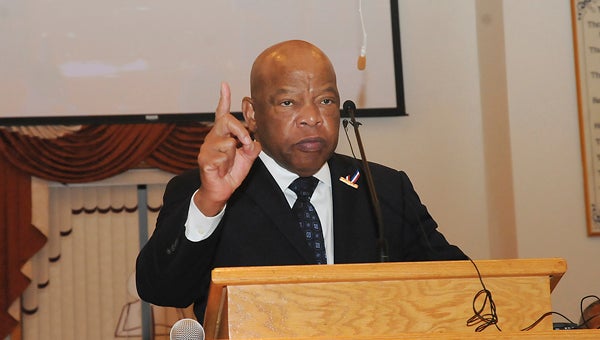F.D. Reese, Jawana Jackson share memories of Dr. Martin Luther King Jr.
Published 10:35 pm Tuesday, April 3, 2018
Dr. Martin Luther King Jr. was assassinated 50 years ago today on April 4, 1968, while standing on the balcony of the Lorraine Motel in Memphis, Tennessee.
King was there in support of a sanitation workers’ strike. Three years earlier, in 1965, King was in Selma fighting for the right to vote and helping the Queen City etch its name into the history books.
Jawana V. Jackson was just a child at the time of King’s tragic, untimely death, but she remembers getting the news of the civil rights icon’s assassination all too well.
Jackson’s parents, the late Dr. Sullivan Jackson and Richie Jean Sherrod Jackson, were close friends with King. They were so close, their home became King’s headquarters during the planning of the Selma to Montgomery marches.
“I think my father put it very well at the time of Dr. King’s death on April 4, 1968,” Jawana said on the eve of the 50th anniversary of King’s death.
“The three of us were having dinner that night, and when we learned of the assassination, my father told my mother and I the world has lost an iconr. We have lost a very dear friend.”
To the world, King is known as a leader in the Civil Rights Movement, as an icon, but to her, he was more than that. He was “uncle” Martin.
While King spent hours planning the voting rights marches, he took time to read her bedtime stories and even have tea and mud cakes.
“One day he had several meetings with people at the house … but I had something else planned, and that was I wanted him to have tea and mud cakes with me,” Jawana recalled. “Through all of the important things he was doing and meetings that he had, he stopped for some time and did have tea and mud cakes with me at the house.”
Decades later, she cherishes those special moments.
“It was very, very special because he was a man that led a major, major movement — not only for this country but for the world. For me to know him as uncle Martin was very, very special,” she said.
“Now, many years later, I am very fortunate that I had the parents that I had, that I had the exposure to Dr. Martin Luther King Jr. and uncle Martin, who made the world and my life much, much better.”
While in Selma, King also developed a friendship with Dr. F.D. Reese, who is now the only living member of the Courageous Eight, who invited King to Selma to join the fight for equal voting rights.
“We were very good partners,” Reese said.
In many pictures from 1965, Reese can be seen standing alongside Dr. King and Coretta Scott King wearing his trademark fedora.
“We marched together and went to jail together,” Reese said. “We tried to do some things together that would make our community better. At times, we were not too successful, and sometimes we were.”
On the anniversary of King’s death, Reese said he would think about his friend and the times they had together in Selma fighting peacefully for the right to vote.
“I’ll be thinking about the great times that we had together. Sometimes the times were not too smooth, but we stayed together and tried to do things together regardless of the circumstances,” Reese said. “I enjoyed being in his presence and with him. He was always a great joy.”
King’s work in Selma with men and women like Reese and the Jackson family led the eventual passing of the Voting Rights Act of 1965. His name has become synonymous with Selma and the voting rights movement. A bust of Dr. King sits on the grounds of historic Brown Chapel AME Church in honor of King and what he did for Selma.



